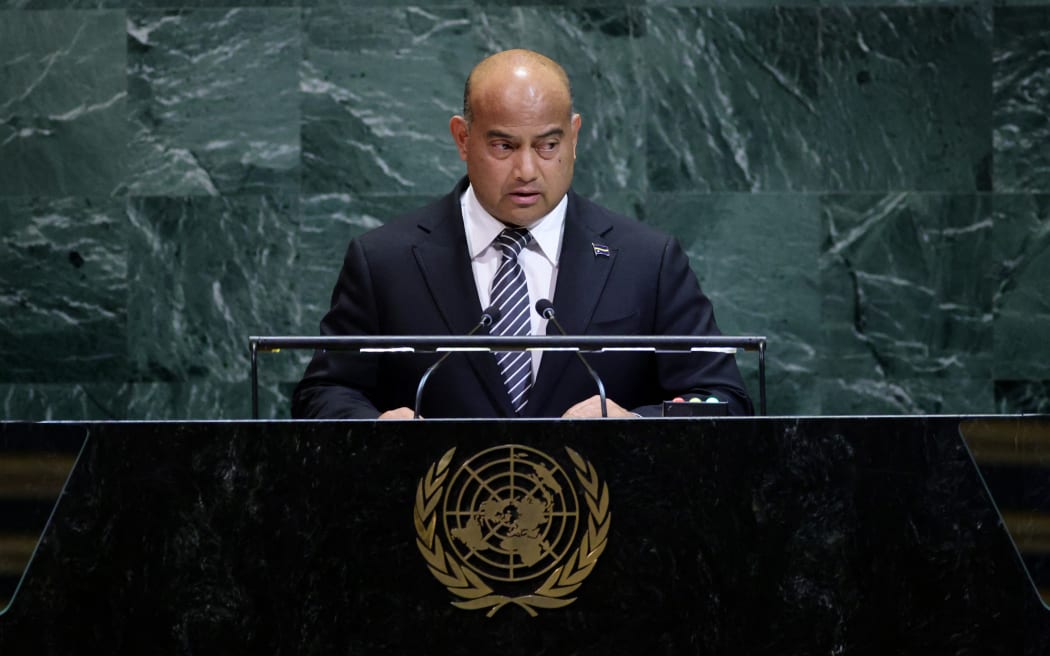World
Pacific Leaders Demand Urgent Climate Action at UNGA

During the recent United Nations General Assembly (UNGA) in New York, leaders from Pacific island nations emphasized the urgent need for climate action, highlighting the barriers faced by small island developing states in accessing climate finance. Nauru’s President, David Adeang, articulated the critical situation, stating that climate change poses a direct threat to the peace, security, and survival of the entire Pacific region.
In his address, Adeang pointed out that despite numerous pledges, those least responsible for climate change are struggling to secure vital resources necessary for both adaptation and mitigation efforts. “Simply put, the time for debate has passed. Concrete climate action cannot be postponed any longer,” he asserted. He further stressed that “History will not judge us by our words, but by the future we build; by whether we choose unity over division, peace over conflict, and shared humanity over selfishness.”
Seabed minerals, according to Adeang, could play a significant role in assisting the transition to renewable energy. He urged the International Seabed Authority (ISA) to act with renewed purpose to fulfill its mandate without delay. “Seabed minerals represent more than economic diversification. They are a pathway to resilience and a chance to contribute to global solutions,” he noted, referencing the importance of polymetallic nodules found in Nauru’s sponsored areas.
The Pacific leaders also introduced the Pacific Resilience Facility, a pioneering initiative that aims to provide a regional climate fund managed by Pacific communities. Marshall Islands President Hilda Heine emphasized the collaborative effort required from global powers to combat climate change. “The future of our youngest generations depends on whether global powers are working together. If I could find a louder alarm for the Pacific Islands than my words today, I would sound it,” she stated, reminding attendees that urgent action is necessary to reduce vulnerability across all key sectors.
Taneti Maamau, President of Kiribati, echoed similar sentiments, stating that while Kiribati faces significant climate challenges, resilience remains possible through global adaptation and resilience efforts. “We urge global actions to limit warming to 1.5 degrees Celsius… giving firm hope and assurance that Kiribati and other vulnerable countries will continue to exist in light of climate change,” he said.
New Zealand’s Foreign Affairs Minister Winston Peters addressed the gathering, highlighting a pressing issue regarding global emissions. Peters noted the disproportionate contribution of a few countries to the global emissions problem, stating, “Four countries comprise 60 percent of the world’s emissions, and the rest of the 191 countries… are wrestling with this problem.” He emphasized the need for honest dialogue about the challenges ahead.
The discussions during the UNGA clearly underscored the urgency for coordinated global action to address climate change, particularly for the Pacific Island nations, who face existential threats from rising sea levels and other environmental challenges. The leaders’ collective call for immediate and effective measures reflects the dire situation that these communities continue to confront.
-

 World4 months ago
World4 months agoTest Your Knowledge: Take the Herald’s Afternoon Quiz Today
-

 Sports4 months ago
Sports4 months agoPM Faces Backlash from Fans During Netball Trophy Ceremony
-

 Lifestyle4 months ago
Lifestyle4 months agoDunedin Designers Win Top Award at Hokonui Fashion Event
-

 Entertainment4 months ago
Entertainment4 months agoExperience the Excitement of ‘Chief of War’ in Oʻahu
-

 Sports4 months ago
Sports4 months agoLiam Lawson Launches New Era for Racing Bulls with Strong Start
-

 World5 months ago
World5 months agoCoalition Forms to Preserve Māori Wards in Hawke’s Bay
-

 Health4 months ago
Health4 months agoWalking Faster Offers Major Health Benefits for Older Adults
-

 Lifestyle4 months ago
Lifestyle4 months agoDisney Fan Reveals Dress Code Tips for Park Visitors
-

 Politics4 months ago
Politics4 months agoScots Rally with Humor and Music to Protest Trump’s Visit
-

 Top Stories5 months ago
Top Stories5 months agoUK and India Finalize Trade Deal to Boost Economic Ties
-

 Health2 months ago
Health2 months agoRadio Host Jay-Jay Feeney’s Partner Secures Visa to Stay in NZ
-

 World5 months ago
World5 months agoHuntly Begins Water Pipe Flushing to Resolve Brown Water Issue









